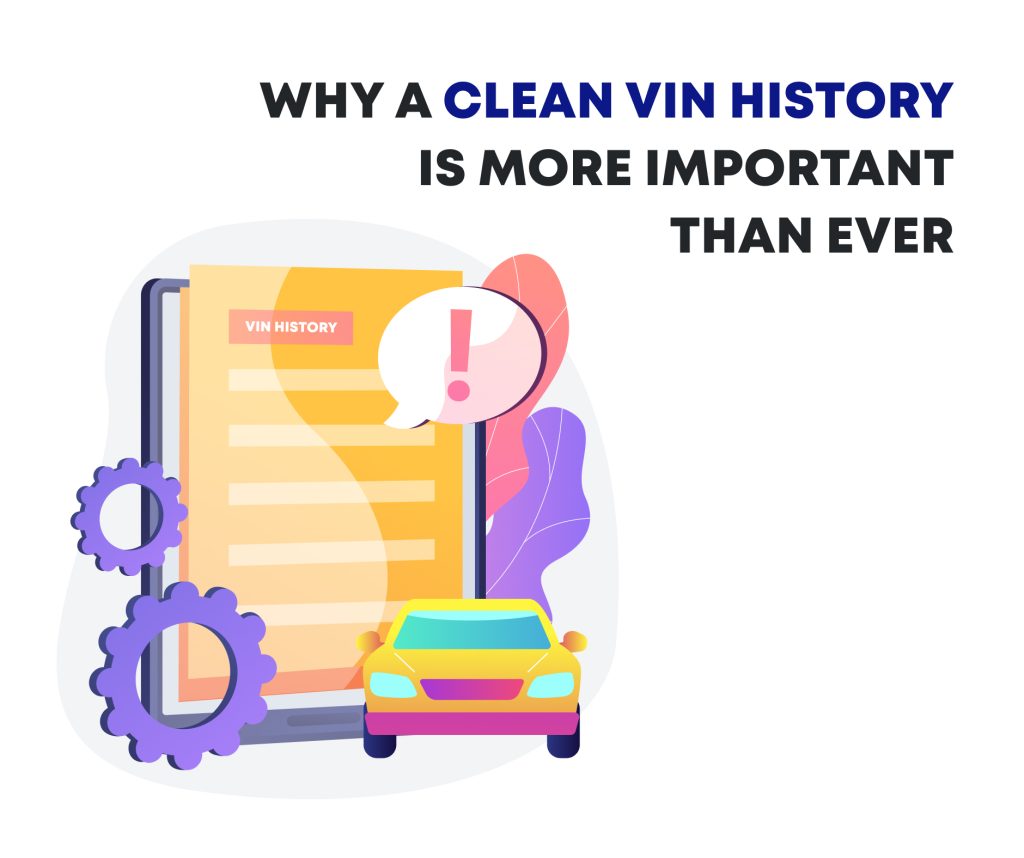To sign up for our daily email newsletter, CLICK HERE

By integrating cutting-edge technologies to provide convenience, safety, and enhanced capability, smart vehicles are changing the automotive scene. These developments, however, also bring further difficulties—especially with relation to the VIN code’s visibility and privacy. This identifier, often called a car’s fingerprint, plays a central role in tracking car history, ensuring reliability in the used car market, and maintaining clear VIN history.
With the rise of publicly accessible VIN history databases, such as Vin.Stat, some car owners are now considering removing outdated or inaccurate information to protect their privacy. Services focused on VIN history repair or removal may assist buyers and sellers in making educated choices by helping to guarantee accurate and relevant data accessible online.
The Growing Role of VIN Codes in the Age of Smart Cars
Although the VIN code has always been essential for vehicle identification, the development of smart technologies has enlarged its importance in the automotive environment. VINs nowadays are gates to comprehensive automotive history and ownership information kept in centralized systems and easily available over the internet, not just static markers.
Understanding VIN Codes and Their Place in Car History
A VIN code is not just a haphazard collection of characters. It includes comprehensive details on the manufacturer, model, engine type, manufacturing date, and place of origin of a vehicle. This identifier is crucial for:
- Tracking Maintenance: Mechanics use the VIN code to ensure that the correct parts and services are applied to a vehicle.
- Ownership Records: Vehicle registries rely on the VIN to establish legal ownership.
- Used Car Transactions: Buyers can access VIN history to verify whether the vehicle has been in accidents, has a clean title, or has undergone significant repairs.
- Insurance Services: Insurers use the VIN number to provide coverage and assess risk.
For consumers, especially those purchasing used cars, a clear VIN history is a sign of trustworthiness. Many buyers rely on various websites, such as Carfax, AutoCheck, or specialized services, to access VIN reports that summarize a vehicle’s past. Sellers with a clear VIN often enjoy higher prices, while vehicles with negative records may struggle to find buyers.
How Smart Car Technology is Redefining VIN Visibility and Use
The proliferation of smart automobiles has fundamentally changed VIN data handling. Getting the VIN number of a car used in the past needed either hand data input or physical examination. Smart automobiles fitted with GPS, IoT sensors, and cloud connections may automatically exchange VIN data.
Benefits of This Evolution:
- Real-Time Data Access: Smart cars can provide real-time updates about maintenance needs, accident detection, and location, enhancing safety and convenience.
- Fraud Prevention: Advanced technology makes it harder to tamper with VIN data, ensuring that car history remains accurate.
Challenges Introduced:
- Privacy Risks: Unauthorized individuals may use the more easily available VIN data for nefarious uses such as car cloning or fraud.
- Over Reliance on Digital Systems: Dependency on digital records might complicate transactions should systems collapse or be compromised.
Although smart technology has surely improved the value of VIN numbers, it also emphasizes the necessity of strong security to secure private car data.
Why a Clean VIN History is More Important Than Ever
Successful transactions in the very competitive used automobile market increasingly depend on a clear VIN record. Even little errors in VIN history may greatly affect a vehicle’s value as buyers depend more on digital tools to evaluate car information.
A clear VIN history not only attracts buyers but also opens up products opportunities for sellers by highlighting the reliability of their vehicles. For instance, including photos of the car alongside the VIN report can enhance the credibility of a listing, especially on major web platforms or Google searches. Let’s look at key reasons for prioritizing a clear vin history:
- Transparency in transactions. Buyers demand transparency when making high-value purchases like cars. A clear VIN assures them that the vehicle has no hidden issues, such as undisclosed accidents or salvage titles. Providing an accurate and accessible vehicle history report is essential for building buyer confidence.
- Avoiding financial loss. Vehicles with incomplete or inaccurate VIN histories can face depreciation, legal disputes, or difficulties in securing insurance. Ensuring the VIN history is correct protects both buyers and sellers from unforeseen expenses.
- Building market trust. The used car market thrives on trust. Sellers who provide a clean VIN history and verifiable car details can differentiate themselves in a crowded marketplace. Adding payment options, such as PayPal, during the payment process, can also simplify transactions for potential buyers.
- Compliance with digital marketplaces. Online platforms and websites that facilitate car sales often require accurate VIN information. A clear VIN ensures compliance and improves the vehicle’s chances of selling quickly. For sellers unsure of how to proceed, professional services like Removevin can advise on steps to delete or erase inaccurate data to maintain integrity.
Given smart automobiles producing and storing vast volumes of data, preserving a clear VIN history calls for awareness. For owners trying to protect the reputation of their vehicles, services provided to erase or fix erroneous or outdated vehicle history may be very useful.

The Debate on VIN Accessibility: Transparency vs. Privacy
The easy access of VIN data has spurred a discussion on the compromises between privacy and openness. Public access to VIN numbers presents hazards for auto owners even as it helps customers.
The Case for Transparency
Transparency in the used car market builds trust and prevents fraud. Open access to VIN history ensures that buyers can verify a vehicle’s condition and make the right decisions. For example:
- Fraud Prevention: Access to VIN reports helps detect cloned or stolen vehicles.
- Consumer Empowerment: Buyers can use sites like Google searches or vehicle reports enhancing confidence in the purchasing process.
The Case for Privacy
On the flip side, excessive visibility of VIN data raises serious privacy concerns:
- Data Misuse: Criminals can exploit VIN information to commit fraud or identity theft.
- Unauthorized Sharing: Data collected by smart cars may be shared with third parties without the owner’s consent.
- Loss of Control: Vehicle owners may have limited options to remove information from public databases.
Balancing these competing interests is essential to foster trust in the automotive market while respecting individual privacy.
What the Future Holds for VIN Number Visibility with Smart Technology
As technology evolves, the management of VIN data will likely become more sophisticated. Here’s what the future might look like:
- Enhanced Data Security
Manufacturers will implement advanced encryption to protect VIN information, reducing the risk of breaches and unauthorized access.
- Blockchain Solutions
Blockchain technology could revolutionize VIN history tracking, creating a secure and immutable record of ownership history and maintenance data.
- Customizable Access Controls
Smart cars may allow owners to customize who can access their VIN numbers, empowering them to control their data.
- International Regulations
Governments in regions like the USA and Canada may introduce stricter laws governing the collection and sharing of VIN data to protect consumer rights.
- Integration with AI
By simplifying the study of automotive history, artificial intelligence might let buyers and sellers make quicker, more accurate judgments.
Cooperation among manufacturers, technology companies, and legislators to handle privacy issues without sacrificing openness will determine the direction of VIN visibility going forward.

Final Thoughts: Navigating the Balance Between Smart Car Innovation and VIN Privacy
The advent of smart automobiles has fundamentally changed VIN number access, storage, and usage. These developments generate difficult issues concerning data privacy and ownership even as they improve ease and safety.
Now more than ever, especially in the used automobile market, keeping a clear VIN history is vital for vehicle owners. To confirm automobile information, buyers depend more and more on websites, reports, and digital tools; so, accurate and easily available VIN data is essential for a good transaction.
Simultaneously, one must overlook the hazards connected to too high VIN visibility. Real hazards requiring proactive responses include unauthorized access, data abuse, and privacy invasions. Safeguarding consumer rights depends much on services that assist in the removal of data or protection of private vehicle information.
The difficulty ultimately comes in striking the correct mix between privacy and openness. The car sector can negotiate this changing terrain and create a smarter, safer future for purchasers and owners alike by using cutting-edge technologies and ethical standards.